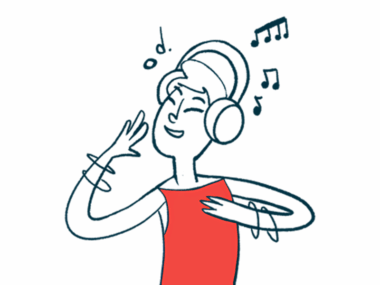Music is good for the mind and soul — and Parkinson’s disease
Music therapy can help with balance, communication, and mental health
Written by |

I love music; I always have. I grew up with hippie parents, and my dad always blasted rock ’n’ roll on his turntable through large, black speakers. He loved classic rock, so we kids did, too. We had little choice in the matter!
When I turned 16, one of the best parts of driving was the freedom I felt with the radio on at full volume and me singing like nobody was listening. It gave me a sense of independence I couldn’t have imagined before. Having the windows down, the music loud, and the wind blowing through my permed ’80s hair was probably the best feeling in the world back then. I didn’t realize then that this feeling would never go away.
Now, at 54, I still feel that intense sense of freedom on a warm spring day when an old song sparks my memory and takes me back in time.
Music can be an escape from the stress of everyday living. Whether you’re dealing with a chronic illness, having a difficult day, or just in a bad mood, music can help brighten your day, even if only for a few minutes. Or it can bring you to tears with sadness and raw emotion as you listen to songs about love and loss.
When I’m not writing my column for Parkinson’s News Today, I work for a medical advocacy organization. Much of my work involves managing care for clients with in-home caregivers. One of my favorite families to work with thought it’d be beneficial to bring therapy into the home to help combat their mother’s diagnosis of dementia. We hired a pet therapist, a physical therapist, a mindfulness coach, and a music therapist. Time with these therapists was all beneficial in many different ways.
Although dementia had robbed her of many things in her life, the one hour a week spent with the music therapist seemed to bring her to a different place. Early on, she’d try to sing along to the old music that jarred her memory. After losing her ability to speak, she’d tap along to the beat and sway to the music as if attempting to dance.
The music therapist came weekly, right up until the last days of the patient’s life. Even during her final visit, the music was still making a positive impact. The sounds of the guitar and beautiful music brought a smile to her face.
‘Sing out loud, sing out strong’
Since I genuinely believe in the benefits that music therapy offers patients with dementia, I decided to investigate the possible benefits for other neurodegenerative diseases, such as Parkinson’s. I was overwhelmed by the amount of information on music therapy and its benefits.
According to the Parkinson’s Foundation, music therapy can benefit patients with Parkinson’s disease who have issues such as balance, communication, cognition, mental health, and social isolation.
The Michael J. Fox Foundation interviewed Kerry Devlin, senior music therapist at Johns Hopkins Center for Music and Medicine in Baltimore. She explained her guidance for those unable to commit to traditional music therapy:
“My prescription for everyone is to sing along (loudly) to one song each day. It can be any song anywhere. This is especially good before a social function where you expect to talk a lot or in busy spaces. Sing loudly in the car on the way there to get your voice going. Singing, either in your head or out loud, also can be a way to start or regulate walking in Parkinson’s.”
The effects of rhythmic auditory queuing and its relationship to gait and posture in patients with Parkinson’s are currently being evaluated and studied. Music might be an easy way to enhance the quality of life for these patients.
Another study at the Johns Hopkins Center for Music and Medicine offered guitar lessons to patients with Parkinson’s. The patients “showed improvement in mood and overall quality of life, and, for some, motor functions, including enhanced posture and gait and the reduction of tremors that affect the hands, legs, and feet,” according to Johns Hopkins Magazine.
The article also mentioned a study that offered 32 participants group singing lessons led by a voice and speech therapist and a professional singing instructor. Researchers observed “not only significant increases in loudness that were sustained after the classes were over, but improvement in several quality-of-life measures, most notably enhanced mood and a reduction in body discomfort.”
Learning about the possible benefits of music in relation to Parkinson’s disease has been eye-opening for me. I’ve already told my husband, Arman, who has early-onset Parkinson’s disease, that he’ll be singing daily, and I plan to sing along with him! I’ll also ask our movement disorder specialist about options for music therapy in our area.
Happy singing to all!
Note: Parkinson’s News Today is strictly a news and information website about the disease. It does not provide medical advice, diagnosis, or treatment. This content is not intended to be a substitute for professional medical advice, diagnosis, or treatment. Always seek the advice of your physician or another qualified health provider with any questions you may have regarding a medical condition. Never disregard professional medical advice or delay in seeking it because of something you have read on this website. The opinions expressed in this column are not those of Parkinson’s News Today or its parent company, Bionews, and are intended to spark discussion about issues pertaining to Parkinson’s disease.



Gary Dempsey
SING, SING, SING, SING. Never stop singing. Keep on singing. I am an 83 yr old with Parkinsons (diagnosed 1995) and have lived a life filled with all kinds of singing, Choral, Barbershop, Pop, Country. I have always sung bass and still have a strong bass voice and still singing every chance I get. I was a Band director who also directed church choirs and loved every minute singing and playing music. Parkinson's is starting to slow down my daily life activities and affects my balance, but my voice is still strong. I'm always hearing "you sure don't sound 83 and you also have Parkinson's?" and I'm quick to tell them I give singing all the credit. Singing makes you feel good and keeps you sounding good. Who knows, maybe singing also slowed down my Parkinson's progression?
Jamie Askari
Hi Gary,
This is amazing to hear!! It sounds like music has truly been great for you in every way. Thanks for sharing your story too, and thanks for reading!
Jill Pfluke
Love this article! It affirms my belief in the therapeutic benefits of music. I have played the violin since I was 4 years old. Two years ago, I was diagnosed with Parkinson’s disease. I can choose to express my feelings through the piece of music I play or I can try to change how I feel in that moment. I perform for others at my place of employment and also where I worship. I hope that they also benefit from listening to me play.🎻🎼🎵🎶🙌🏻🙏❣️
Jamie Askari
Hi Jill,
I am sure that they love to hear you play. I am so glad that you enjoyed my column and I thank you for reading!
Don Harris
Very interesting article. Perhaps I should also try singing but I have a strong inhibition: when I was in primary school I was told to only mime in a 1,000 voice coir! Maybe I could try it alone whilst driving.
Jamie Askari
Hi Don, that is too bad to hear. I think singing while driving is a fantastic idea! Thank you for reading.